When it comes to towing and maneuvering your caravan safely and efficiently, a caravan jockey wheel is not just a convenience—it’s a necessity. This essential mechanical device supports the front of your caravan when it’s not hitched to a tow vehicle, allowing you to move, lift, and position your setup with far greater ease. Whether you're setting up at camp or simply adjusting the trailer in your driveway, jockey wheels play a crucial role in handling and stability. And while jockey wheels assist with movement and front-end support, caravan jacks are equally important for leveling and stabilising your caravan once parked—you can read more about choosing the right caravan jack here.
So why does the right jockey wheel matter? A high quality jockey wheel can significantly improve your towing experience. It adds stability when parked, enhances safety during unhitching, and makes moving your caravan (especially on uneven terrain or in tight spots) a much simpler task. From heavy duty jockey wheels built for rugged off road adventures to electric jockey wheels that take the effort out of maneuvering, there's a wide range of options to suit every caravan setup.
In this caravan jockey wheel guide, we’ll walk you through everything you need to know to make an informed purchase. You’ll learn about the different types of caravan jockey wheels, how to choose the right one for your caravans needs, a breakdown of top rated brands and models, expert advice on jockey wheel installation and maintenance, and tips on useful upgrades and accessories. Whether you're a first time buyer or upgrading your current setup, this guide has you covered!
Types of Caravan Jockey Wheels
Caravan jockey wheels come in a range of operation types, each suited to different needs and levels of physical effort. Choosing the right mechanism can make a significant difference to your caravan setup routine, especially when dealing with different terrains, caravan weights, and user preferences.
Manual or Standard Jockey Wheels
Standard or manual jockey wheels are the most commonly used across Australia. Operated by a hand crank, as the name suggests, they allow you to raise or lower the front of your caravan manually. These jockey wheels are simple, reliable, and budget friendly, making them a popular choice for casual and experienced caravanners alike.
Brands like Alko and Ark offer sturdy, corrosion resistant manual jockey wheels designed to withstand the harsh Australian climate. Most come with adjustable heights and various wheel sizes to suit different caravan weights and ground conditions. While they require some physical effort, their reliability and ease of maintenance make them a solid choice for many setups.
Electric/Motorised Jockey Wheels
For those who want to eliminate manual labor from their setup process, electric jockey wheels are a game changer. These units typically feature motorised lifting and even remote controlled movement, allowing you to steer your caravan into place with precision, perfect for tight storage spaces or uneven ground.
Models like the Black Jack Electric Jack offer push button convenience and robust lifting power, with built in safety features such as automatic braking and overload protection. These are especially ideal for older caravanners or anyone looking to make towing and parking as effortless as possible.
If you regularly tow heavier vans or want added convenience, investing in an electric jockey wheel is well worth considering. Their reliability, smooth operation, and ease of use make them a standout upgrade. Black Jack also has the Black Jack Mini and Maxi, covering all types and weights of caravans on the Australian market. The Black Jack Mini is specifically designed to fit into the existing jockey wheel mount, avoiding the need to install on the A-Frame and take up precious space.
Hydraulic jockey wheels, like the popular Trail-A-Mate Hydraulic Jack, combine the functionality of a jockey wheel with the power of a hydraulic jack. Instead of relying on manual winding or an electric motor, these units use hydraulic pressure activated by a hand pump to raise and lower the caravan with minimal physical effort.
This means the lifting is done via fluid driven force, allowing for smoother, more controlled movement, especially under heavy loads. These are ideal for heavier caravans or off road vans that need additional lifting power and durability.
The hydraulic mechanism allows for smooth and powerful lifting with minimal effort, making it a smart choice for those who often travel in remote or rugged locations. The Trail-A-Mate is a standout product in this category, often chosen for its versatility, it can be used both as a jack and a jockey wheel, which is a big plus for space conscious travellers.
Hydraulic systems are also highly regarded for their stability and strength, making them a reliable solution when safety and performance are top priorities.
Ratchet Jockey Wheels
Less common but still useful in specific applications, ratchet jockey wheels use a manual ratcheting mechanism to help maneuver a trailer in small increments. While not as smooth or versatile as the other types, they can be handy in tight spaces where precision is needed and aren’t reliant on external power sources.
Wheel Configuration
The wheel configuration of a caravan jockey wheel plays a critical role in how well it performs under different load conditions and terrain types. From single wheel designs to dual wheel setups, and the choice between solid vs. pneumatic wheels, the right configuration can make maneuvering your caravan smoother, safer, and more efficient.
Single Wheel Designs
Single wheel jockey wheels are the most common and budget friendly option. They’re lightweight, easy to operate, and work well for smaller caravans or trailers on firm, level surfaces like paved driveways and caravan parks. However, when dealing with uneven or soft ground, single wheels can sometimes struggle with stability or sink under pressure.
These are a great option for caravanners who primarily travel on sealed roads or only need a jockey wheel for occasional repositioning in stable environments.
Dual/Twin Wheel Models
For improved weight distribution and greater stability, especially on rough or uneven terrain, dual wheel jockey wheels are the better choice. Twin wheels spread the load more evenly, reducing the risk of sinking or tipping, and offer better grip and control when turning or pushing the caravan manually.
They’re particularly useful for heavy duty jockey wheel applications or larger caravans that need to support heavier loads. Many electric jockey wheel models come in twin wheel formats to enhance traction and directional control.
Solid Wheels vs. Pneumatic (Air-Filled) Wheels
The type of wheel material also impacts performance, particularly when it comes to terrain adaptability.
Solid wheels are typically made of hard rubber or plastic. They’re durable, puncture proof, and ideal for hard surfaces like asphalt, gravel, and concrete. These wheels require very little maintenance and are great for all weather use but they may struggle in softer environments where traction and flexibility are required.
Pneumatic wheels, on the other hand, are inflatable tyres designed for softer, looser ground.
For loose terrain, such as grass, sand, or muddy soft ground, look for a pneumatic wheel model. These tyres provide better shock absorption and a larger surface area to reduce sinking. If you’re travelling on road and off road, get both! This will ensure you aren’t caught out in different environments.
A well designed wheel configuration whether it’s single or dual, solid or pneumatic, can make all the difference in how easily you can handle and position your caravan across various settings.
Mounting Style
When selecting a caravan jockey wheel, the mounting style is just as important as the wheel type itself. The way your jockey wheel attaches to the drawbar affects both its performance and how easy it is to use. The three main styles: fixed, swivel bracket, and clamp on/bolt on/weld on options, offer different benefits depending on your towing setup and travel needs.
Fixed Jockey Wheels
Fixed jockey wheels are either bolted or welded directly onto the caravan’s drawbar. These are highly secure and are often used in permanent setups or where minimal adjustment is needed. A welded on jockey wheel is extremely strong, making it a common choice for heavy duty applications or off road caravans.
However, the lack of mobility can be a downside. Fixed wheels stay in one position, which can be problematic when traveling or storing your caravan, as they may reduce ground clearance or be exposed to damage.
Swivel Bracket Jockey Wheels
Swivel jockey wheels are among the most popular and versatile options on the market. These feature a swivel bracket that allows the jockey wheel to swing up and away when not in use, locking securely into a stowed position for travel.
This design maximises ground clearance and protects the wheel during transit. Swivel jockey wheels are commonly found on both manual and electric jockey wheel models, offering both strength and convenience.
Our pick is the Alko 6 Jockey Wheel, which comes with a swivel bracket for quick and easy uncoupling of your caravan.
Clamp On vs. Bolt On vs. Weld On Options
|
Mounting Type |
Description |
Strength |
Adjustability |
Best Use Case |
|
Clamp-On |
Secures using a clamp around the drawbar |
Moderate |
Highly adjustable & removable |
Casual users, light caravans |
|
Bolt-On |
Bolted through pre-drilled holes in the frame |
Strong |
Semi-permanent, can be removed with tools |
Most common setups |
|
Weld-On |
Permanently welded to the drawbar |
Maximum strength |
Fixed position |
Heavy-duty, off-road use |
-
Clamp on jockey wheels are great for caravanners who want flexibility. They’re easy to install, adjust, and remove, ideal for lighter vans or temporary setups. However, they may not offer the same strength as bolt on or weld on styles.
-
Bolt on jockey wheels strike a great balance, offering solid strength while still being removable with basic tools.
-
Weld on jockey wheels are for those who want a permanent, ultra secure setup, especially those that can handle rugged terrain or heavier caravans.
Selection Criteria: How to Choose the Right Jockey Wheel
Weight Considerations
One of the most critical factors when selecting a caravan jockey wheel is ensuring it can safely support the weight of your caravan. Choosing a jockey wheel with the correct load rating is essential not only for smooth operation but also for safety during towing, parking, and unhitching.
How to Calculate the Load Rating You Need
The load capacity of a jockey wheel should exceed the ball weight of your caravan, not its entire tare mass (total unloaded weight). The ball weight is typically around 10% of the caravan’s tare weight, but this can vary depending on your setup and how your gear is loaded.
To determine the minimum load rating your jockey wheel should have, follow this formula:
Caravan Tare Weight × 10% = Minimum Ball Weight
For example:
-
If your caravan has a tare mass of 2,000 kg, the estimated ball weight would be around 200 kg.
-
Your jockey wheel should therefore have a load rating well above 200 kg, ideally in the range of 250–300 kg or more, depending on your usage.
Recommended Safety Margins
It’s strongly advised to include a safety margin to account for:
-
Gear loaded into the caravan (which increases ball weight)
-
Off road or uneven terrain where stress on the jockey wheel is higher
-
Long term durability and wear resistance
For on road touring, aim for a minimum 25% buffer above your calculated ball weight. For off road or rugged conditions, increase the safety margin to at least 40–50%.
Weight Ratings by Caravan Type
|
Caravan Type |
Estimated Ball Weight |
Recommended Jockey Wheel Rating |
|
Small Camper Trailer (1,200 kg tare) |
120–150 kg |
200–250 kg |
|
Standard Single-Axle Caravan (2,000 kg tare) |
180–220 kg |
300–350 kg |
|
Full-Sized Tandem-Axle Caravan (3,000 kg+ tare) |
250–350 kg |
400–500 kg+ |
|
Off-Road/Heavy-Duty Caravan |
300–400 kg |
500 kg+ with extra safety margin |
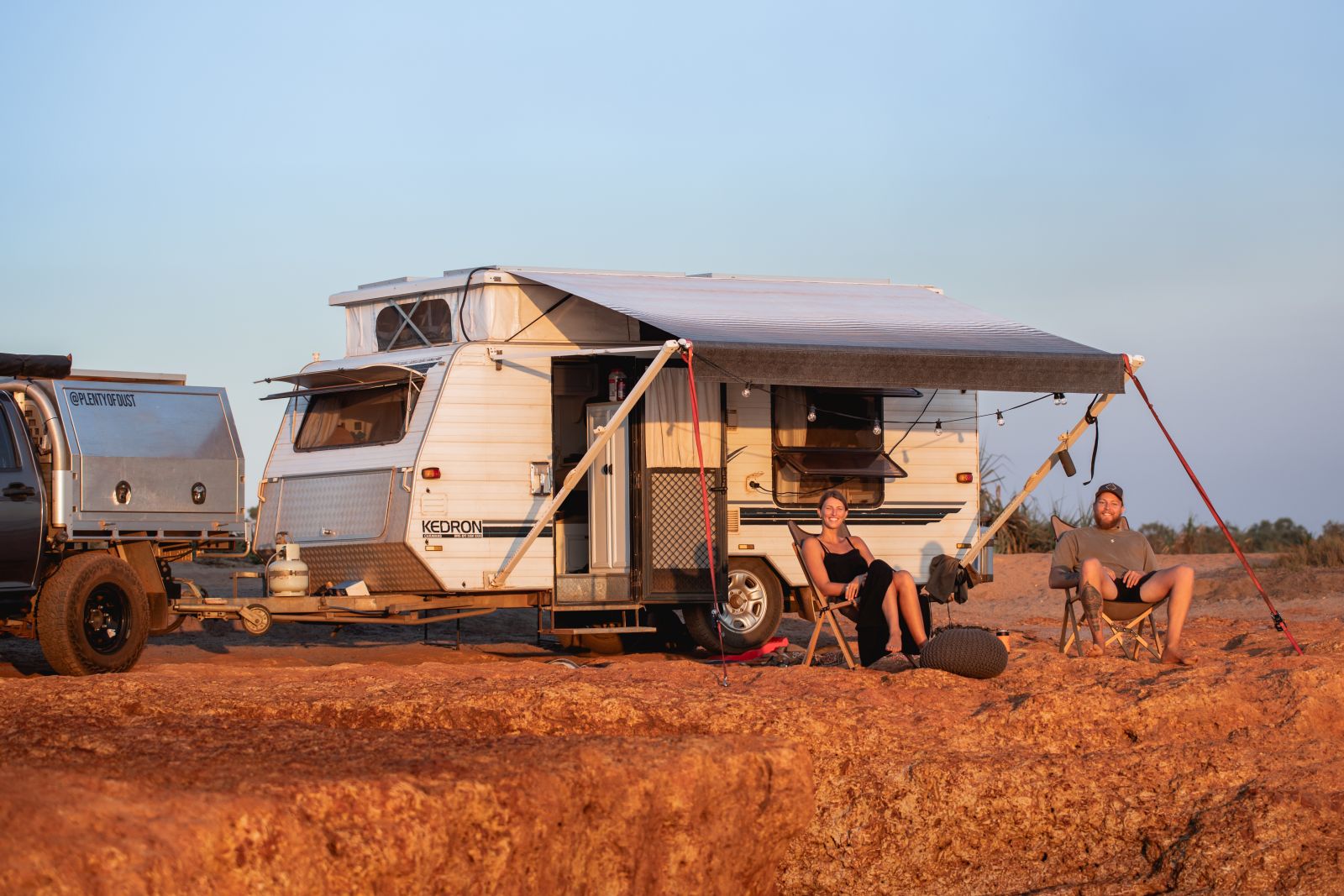
Choosing a jockey wheel that’s under rated for your caravan can lead to premature failure, difficult maneuvering, and even structural damage. Always match your jockey wheel to your actual towing requirements, not just the bare minimum.
Terrain and Usage
Beyond load rating, the terrain you travel through and how frequently you move your caravan should play a central role in your jockey wheel decision. Terrain isn't just about what’s underfoot, it directly affects how easily you can position your caravan and how long your jockey wheel will last. A wheel that performs well on a sealed driveway might become a liability on a remote, rutted bush track.
Ask yourself:
-
Will you mostly be setting up on paved caravan parks, or will your adventures take you to national parks, beach campsites, or outback trails?
-
Do you deal with muddy driveways, loose gravel, or soft sand around your home base or where your caravan is stored?
Matching your jockey wheel to the worst case terrain you’re likely to encounter is a smarter strategy than optimising for ideal conditions.
On Road vs. Off Road Use
-
On road caravanners can get excellent performance from a compact single wheel unit with a solid tyre and swivel mount. These are designed for convenience, easy to wind, stow, and maintain.
-
Off road travellers, on the other hand, should consider wider wheels (or twin wheel configurations) with strong bearings and flexible mounts that can handle bumps, dips, and uneven terrain. Air filled wheels reduce the risk of bogging in soft ground, and electric jockey wheels provide much needed assistance on rough inclines or heavy vans.
.jpg)
Frequency of Use
How frequently you hitch, unhitch, and reposition your caravan will impact both the design features you need and the durability required.
Occasional users may not need powered assistance or dual wheels, but they should still invest in quality materials to avoid failure during long storage periods or infrequent use. Simpler designs with manual operation and clamp on fittings often suffice.
Frequent users, especially full time caravanners or those who move every few days, will benefit from added efficiency. Look for:
-
Ergonomic handles for easier winding
-
Low maintenance swivel mechanisms
-
Corrosion resistant finishes (zinc plated or galvanised)
-
Remote operated electric jockey wheels for heavy vans or solo travellers
Caravan Compatibility: Getting the Right Fit
When selecting the ideal caravan jockey wheel, it’s not just about terrain or weight, it’s also about ensuring the wheel is compatible with your caravan’s setup. Everything from your drawbar style to your towing height impacts which jockey wheel will provide the best performance.
Matching Jockey Wheels to Caravan Setups
Caravans come in a range of configurations, from compact pop tops and hybrids to full sized off road tourers, and each style requires different features from a jockey wheel.
Smaller caravans and campers: These often have lower ball weights and shorter A frames, which can be well served by a standard manual jockey wheel. A single solid wheel or light duty pneumatic version is usually sufficient if you're sticking to paved sites.
Full sized touring caravans: With heavier loads and more gear on board, these setups benefit from heavy duty jockey wheels, ideally with a swivel mount, wide wheels, and a higher load rating. Manual or electric jockey wheels with remote operation such as the Black Jack Electric Trailer Jack Bundle with Jockey Wheel can save time and effort when hitching on uneven ground.
Off road caravans: Built for rugged tracks and remote sites, these require jockey wheels with superior ground clearance, wider wheel bases, and reinforced frames. Look for off road rated models with pneumatic tyres and extended lift range to handle varied conditions.
If you frequently reposition your caravan solo, or travel with a larger family van, upgrading to an electric jockey wheel is a game changer.
Height Range and Towing Setup Considerations
The height travel of your jockey wheel must accommodate both your caravan’s unhitched resting position and the height of your tow vehicle’s hitch. Inadequate lift or drop range can lead to unstable coupling, poor clearance, or the inability to raise the A frame high enough for secure storage.
Key factors to check:
-
Hitch height of your tow vehicle (especially 4WDs)
-
Suspension modifications on the caravan or car
-
Inclines or uneven surfaces where you often park or unhitch
Choosing a jockey wheel with a broad height range or telescopic shaft is particularly important for off road vans or vehicles with aftermarket lift kits.
A Frame and Drawbar Mounting Compatibility
Your caravan’s A frame dimensions and structure directly influence what type of jockey wheel mounting is suitable:
-
Clamp on jockey wheels are versatile and common for standard box section drawbars (typically 50mm–75mm wide). They're ideal for DIY installation and regular maintenance.
-
Bolt on jockey wheels offer a more secure fit for heavier caravans but require a flat section of drawbar and, in many cases, pre-drilled holes.
-
Weld on brackets are a permanent solution, often preferred for long term durability on heavy or off road caravans, however they do require professional installation.
It’s also essential to ensure there’s enough space on the A frame for your jockey wheel to be mounted without interfering with toolboxes, stone guards, or gas bottle holders.
Before purchasing, measure your drawbar’s width, available mounting space, and the clearance needed for the jockey wheel to swing or stow when travelling. A poor fit can impact safety and usability.
Budget Considerations: Getting the Best Value for Your Setup
A caravan jockey wheel might seem like a small part of your overall setup, but choosing the right one can save you serious time, effort, and maintenance costs over the long run. Whether you're sticking to a tight budget or investing in premium gear, understanding the cost benefit trade offs is key to making an informed, smart decision.
Understanding the Price Range
Jockey wheels for caravans can range from under $100 for basic manual models to over $600 for high end electric jockey wheels with remote control and advanced features. Here’s a quick overview of what to expect at each level:
|
Price Range |
Typical Features |
Ideal For |
|
$55–$200 |
Manual operation, single solid wheel, clamp-on mounting |
Light caravans, box trailers, occasional users |
|
$200–$500 |
Heavy duty frames, dual wheels, pneumatic tyres, swivel brackets, small electric lifts |
Touring caravans, mixed terrain, regular users |
|
$500–$650+ |
Electric or hydraulic lift, remote control, reinforced chassis |
Off-road setups, large vans, solo travellers |
A higher price tag often reflects enhanced durability, convenience, and usability, particularly under demanding travel conditions. It makes sense to invest in premium features if:
-
You tow frequently or move campsites every few days
-
Your caravan is heavy, off road, or lifted
-
You regularly hitch up alone and want to reduce physical strain
-
You camp in varied or remote terrain where ease of maneuvering is critical
If any of the above apply to you, features like powered lifting, remote control, or dual pneumatic wheels can dramatically improve your setup and pack down time and ease. The Black Jack Electric Jockey Wheel, for example, is a popular choice among full time travellers and remote campers for this reason.
Manual vs. Electric: A Cost-Benefit Comparison
|
Feature |
Manual Jockey Wheel |
Electric Jockey Wheel |
|
Upfront Cost |
Low to moderate |
Higher |
|
Ease of Use |
Moderate (requires winding effort) |
Excellent (push-button or remote control) |
|
Setup/Teardown Speed |
Slower |
Faster, especially solo |
|
Maintenance |
Minimal |
May require battery checks, servicing |
|
Ideal User |
Budget conscious, occasional towers |
Frequent travellers, heavier caravans |
If your goal is value for money, start by assessing how much use your jockey wheel will actually get. For weekenders with a mid sized van, a quality manual heavy duty jockey wheel may deliver all the reliability needed without overcapitalising. On the other hand, if you're investing in a premium caravan and planning extended road trips, the extra outlay on a powered model will definitly pay off quickly in convenience and ease of use.
Detailed Brand and Product Analysis
When it comes to high end caravan jockey wheels, selecting the right brand can make a significant difference in the performance, ease of use, and overall durability of your setup.
Black Jack Range: Electric Power for Effortless Maneuvering
If you’re looking to eliminate the physical strain of setting up and unhitching your caravan, Black Jack is a leading choice. Known for their electric operation, Black Jack jacks provide an incredibly efficient and easy to use system that saves both time and effort, perfect for solo travellers or those with larger caravans.
With just the push of a button, this electric motorised jockey wheel can raise or lower your caravan off the tow vehicle, allowing you to unhitch with ease. The electric operation is ideal for those who need a quick, stress free setup, especially when travelling alone or with heavy caravans.
For ultimate convenience, the Black Jack Electric Trailer Jack Bundle combines the best of both worlds. This bundle includes the jockey wheel for moving your caravan and a powerful electric trailer jack for raising and lowering the vehicle with ease. Once connected to a power source, the unit provides seamless operation, making it ideal for those who frequently unhitch, perform maintenance, or need to lift their caravan for tyre repairs.
Key features include:
-
Electric Operation: Push-button control to raise and lower your caravan.
-
Versatile: The bundle includes both a jockey wheel and a trailer jack, making it ideal for lifting and moving.
-
Efficient: Saves time and physical effort, especially for solo travellers.
-
Heavy Duty: Suitable for larger caravans and regular use.
Trail-A-Mate: Australian-Made Hydraulic Innovation
For those who prefer a more manual approach with the added benefit of hydraulic power, Trail-A-Mate provides a superior solution. Known for its innovative design and Australian made quality, Trail-A-Mate hydraulic jockey wheels offer both ease of use and versatility
Trail-A-Mate Hydraulic Jockey Wheel and Jack: The Trail-A-Mate Hydraulic Jockey Wheel can be transformed into a solid base jack when needed, making it a dual purpose tool for both hitching and tyre repairs. Capable of supporting up to 1000kg, it’s a solid choice for larger and off road caravans. Whether you're off the beaten track or simply need a reliable way to unhitch, this hydraulic system provides smooth, controlled lifting without the strain of manual winding.
Key features include:
-
Dual Function: Can be used as both a jockey wheel and a jack.
-
Hydraulic Operation: Smooth, easy lifting ideal for larger or heavier caravans.
-
Heavy Duty: Supports up to 1000kg, making it compatible with off-road setups.
-
Versatile: Great for both unhitching and routine maintenance, like tyre changes.
Mid-Range Options: Reliable Performance for Everyday Use
If you're looking for quality caravan jockey wheels that strike a balance between affordability and performance, mid range options from trusted brands like AL-KO and ARK are excellent choices. These brands offer durable, efficient products suited for regular use, whether you're hitting the open road or tackling off road adventures.
AL-KO: Industry Standard for Over 20 Years
For more than two decades, AL-KO has been a name synonymous with high quality caravan products, including their jockey wheels. Known for their reliability and robust build, AL-KO jockey wheels are designed to withstand everyday wear and tear, offering excellent value for money.
AL-KO Jockey Wheels designs are versatile, offering solid or pneumatic tyres, depending on your preference and terrain. Whether you need a simple manual jockey wheel for lightweight caravans or a heavy duty electric model for larger setups, AL-KO has you covered.
Key features include:
-
Durability: Built to last, with high quality materials and a trusted track record.
-
Variety: Offers both manual and electric options, with different wheel types and sizes to suit your caravan.
-
Ease of Use: Designed for everyday use, making hitching and unhitching simple and efficient.
-
AL-KO Jockey Wheels are a great option for those who value reliable performance and industry leading design without the premium price tag of top tier brands.
ARK: Heavy Duty and Off Road Options
For those who require heavy duty and off road ready options, ARK is the go to brand for rugged and versatile jockey wheels. Designed specifically for larger, off road caravans, ARK jockey wheels excel in tough conditions where traditional models might fall short.
ARK Jockey Wheels is built with durability in mind, featuring a strong steel frame, a large pneumatic tyre, and an adjustable height to handle rough terrain. These models are perfect for caravans that need a reliable jockey wheel for both on road and off road conditions. The ARK XO Jockey Wheel, for instance, is designed with extra strength and stability, making it suitable for larger caravans or those regularly venturing off the beaten path.
Key features include:
-
Heavy Duty: Built for rugged conditions, ideal for off road caravans.
-
Large Pneumatic Tyres: Provides added stability and ease of use on softer or uneven surfaces like sand, mud, and gravel.
-
Adjustable Height: Ensures compatibility with a variety of towing setups, including higher A-frames and drawbars.
Budget Friendly Choices: Affordable Yet Reliable Jockey Wheels
If you're on a budget but still want a reliable and safe jockey wheel for your caravan, there are plenty of entry level options available that offer excellent value without compromising on quality. Brands like COAST, Supex, and ARK offer cost effective models designed for occasional use. These jockey wheels provide the essential features you need for hitching and unhitching without the premium price tag.
COAST is a well known brand for producing entry level caravan accessories, including jockey wheels that deliver solid performance at an affordable price. COAST Jockey Wheels are ideal for those who use their caravan infrequently but still want a dependable tool for hitching and unhitching.
These manual jockey wheels feature a galvanized steel frame, offering corrosion resistance for longevity. While they lack the high end features of electric or hydraulic models, they are more than adequate for lighter caravans or those who only need to use the jockey wheel occasionally.
Key features include:
-
Manual Operation: Simple, cost effective operation.
-
Galvanised Steel: Weather resistant construction for durability.
-
Affordable: A budget friendly option for those who need a reliable jockey wheel for only occasional use.
Supex: Simple, Reliable, and Cost Effective
Supex is another trusted brand in the caravan accessory market, known for its budget friendly yet reliable products. Supex jockey wheels are designed for occasional use, making them ideal for casual caravanners or those with lighter caravans.
Supex offers both manual and electric jockey wheels, though their manual options are especially popular for those on a budget. These models are made from galvanized steel, providing durability without a hefty price tag. They're a great choice for those who need a basic, reliable jockey wheel for occasional trips.
Key features include:
-
Simple Manual Operation: Ideal for those with lighter caravans.
-
Galvanised Steel: Rust-resistant for outdoor use.
-
Budget-Friendly: Offers great value for occasional caravanners.
Comparison: Premium, Mid-Range, and Budget-Friendly Jockey Wheels
|
Brand & Model |
Load Capacity |
Wheel Size |
Construction Material |
Special Features |
|
Up to 1600kg lifting capacity |
200mm |
Steel Frame, Powder Coated |
Dual Function (Jockey Wheel + Trailer Jack), Electric Operation |
|
|
Up to 1000kg |
230mm |
Steel Frame, Hydraulic Components |
Dual Function (Jockey Wheel + Hydraulic Jack), Heavy Duty |
|
|
Up to 350kg |
200mm (Solid or Pneumatic) |
Galvanised Steel Frame |
Simple Manual Operation, Affordable, Reliable |
|
|
Up to 500kg |
250mm |
Steel Frame, Zinc-Coated |
Heavy Duty, Off-Road Ready, Adjustable Height |
|
|
Up to 750kg |
250mm (Pneumatic) |
Steel Frame, Zinc-Coated |
Large Pneumatic Tyres, Great for Off-Road, Adjustable Height |
|
|
Up to 350kg |
200mm (Solid or Pneumatic) |
Galvanised Steel Frame |
Manual Operation, Budget-Friendly, Weather-Resistant |
|
|
Up to 350kg |
200mm (Solid or Pneumatic) |
Galvanised Steel Frame |
Manual Operation, Affordable, Simple Design |
Installation and Maintenance: How to Install and Maintain Your Jockey Wheel
Installing your caravan jockey wheel can be a straightforward task if you follow the correct steps and take necessary safety precautions. Here’s a comprehensive guide to help you get the job done safely and efficiently:
-
Prepare the Tools and Equipment: Ensure you have the correct tools on hand before beginning the installation. This will typically include a wrench or socket set, drill (if required), screwdriver, and measuring tape. If your jockey wheel requires bolting or welding, ensure that the appropriate bolts, nuts, and washers are ready.
-
Position the Jockey Wheel Bracket:
-
For manual jockey wheels, you’ll usually mount the bracket on the drawbar of your caravan.
-
For electric or hydraulic jockey wheels, ensure that you mount the bracket securely in a way that allows for smooth operation of the motor or hydraulic system.
-
-
Mark and Drill Holes (if needed): Use a measuring tape to mark the exact position where the jockey wheel will be mounted on the drawbar. Ensure the holes are drilled in the right spots for the bracket or mounting plate. Be careful not to drill into any vital components such as wiring or gas lines.
-
Attach the Mounting Bracket: Secure the mounting bracket to the drawbar using the appropriate bolts or welding. If you're using bolts, make sure they are tightened securely but don’t over tighten, as it could cause damage to the bracket or the drawbar. If you're using a weld on design, take extra care to weld it securely in place.
-
Mount the Jockey Wheel: Once the bracket is securely in place, attach the jockey wheel itself. For manual models, simply slide the wheel into the bracket, making sure it’s locked into position. For electric or hydraulic jockey wheels, follow the specific manufacturer’s instructions to connect the power or hydraulic lines, ensuring everything is tight and secure.
-
Test the Operation: Once the jockey wheel is installed, test its movement to ensure that it can raise and lower smoothly. For electric models, test the remote control to ensure the motor is functioning as expected. For manual models, make sure the handle operates smoothly and securely.
Safety Precautions:
-
Always disconnect the battery (for electric models) before installation to prevent any risk of electric shock or short circuits.
-
Wear safety gear such as gloves and safety glasses to protect against any sharp edges, debris, or flying objects when drilling or welding.
-
If using electric tools or a welder, make sure you follow the manufacturer’s guidelines and have adequate ventilation, especially if working in a closed space.
Common Installation Mistakes to Avoid
While installing a jockey wheel might seem simple, there are some common mistakes that many people make. Here’s a list of mistakes to avoid during installation:
-
Incorrect Mounting Height: Make sure the jockey wheel is mounted at the correct height for your caravan’s drawbar. If mounted too high or low, it can cause difficulty when raising or lowering the caravan.
-
Misaligned Bracket: Always double check the alignment of the mounting bracket. If it’s not level or straight, the jockey wheel won’t function properly.
-
Over tightening Bolts: While it's essential to tighten bolts securely, over tightening can damage the frame or bracket, making it difficult to adjust the jockey wheel in the future.
-
Ignoring Weight Distribution: If your jockey wheel is used to handle the load of your caravan, it’s important to ensure the weight distribution is correct. Avoid using an under rated jockey wheel for your caravan’s load capacity.
-
Forgetting to Check Wiring (Electric Models): For electric or hydraulic models, ensure that all wiring is correctly connected and insulated. Failing to secure wiring can lead to shorts or malfunctioning systems.
Considerations for Different Mounting Brackets and Drawbar Types
There are various mounting styles for jockey wheels that may require different approaches for installation. Consider these factors:
-
Fixed Mounting Brackets: These are often welded or bolted directly to the drawbar. It’s important to position the mounting bracket at the correct height to avoid interference with the tow bar or caravan body.
-
Swivel Bracket Mounting: These allow the jockey wheel to swing up for travel and swing down when needed for support. Make sure there’s adequate space for it to move freely without obstruction from other components.
-
Clamp-on Brackets: These offer a quick and simple installation method. However, they may not be as secure as bolted or welded options, so check for tightness after every use.
-
Drawbar Type: The design of your caravan’s drawbar will affect the installation. Ensure you choose a jockey wheel with the appropriate mounting system for your drawbar, whether it's round or square.
Maintenance Procedures: Keep Your Jockey Wheel in Top Condition
Regular maintenance of your caravan jockey wheel is essential for ensuring long term performance, safety, and reliability. Whether you’ve invested in a premium electric jockey wheel or a manual model, all jockey wheels require some degree of upkeep. This section outlines a practical maintenance guide, including a checklist, lubrication tips, bearing care, and specific wheel care recommendations.
Inspect your jockey wheel for the below checks regularly, especially before long trips. Use this checklist to help keep it in optimal condition:
-
Inspect wheel tread for wear, punctures (pneumatic), or cracking (solid)
-
Check the mounting bracket for signs of rust, loose bolts, or warping
-
Test rotating and swivel function to ensure smooth pivoting and retraction
-
Check bearings and axles for play, noise, or signs of seizure
-
Ensure all nuts and bolts are tight, especially on clamp on and bolt on models
-
Verify electric or hydraulic operation, including power supply and connection
Upgrades and Accessories
Upgrading your caravan jockey wheel setup isn’t just about replacing the wheel itself, there’s a wide range of accessories that can enhance safety, stability, and ease of use. Whether you’re aiming for smoother towing, easier setup, or more accurate weight distribution, the right support accessories can make all the difference.
Jockey Wheel Stands and Stabilisers
A jockey wheel stand or pad provides a bigger, more stable base for your jockey wheel, especially on soft or uneven ground. These are particularly useful when camping on grass, sand, or gravel, as they prevent the wheel from sinking. Some stabilisers also double as chocks or levelling aids, offering multi purpose functionality. Look for durable materials such as UV resistant plastic or galvanised steel, especially for regular outdoor use. Take a look at the Black Jack Foot Pad.
Weight Distribution Systems
While not directly part of the jockey wheel assembly, weight distribution hitches play a vital role in maintaining proper towing balance. These systems help redistribute weight evenly across the caravan and tow vehicle axles, reducing sway, improving braking, and easing the load on your jockey wheel when stationary. If your caravan’s front end appears to sag or the tow vehicle lifts when hitched, a weight distribution system is highly recommended.
Ball Weight Scales
Knowing your caravan’s ball weight with a weight scale is essential to safe towing, and it also helps in choosing and preserving your jockey wheel. By keeping the ball weight within your vehicle’s recommended limits, you avoid overloading the jockey wheel or risking poor handling. This is especially important for off road or long haul travellers carrying water tanks, gear, and bikes.
Wheel Chocks and Locks
Wheel chocks help stabilise the caravan when parked and prevent accidental movement, especially on sloped or uneven surfaces. Pairing these with your jockey wheel adds another layer of safety during setup or maintenance. Meanwhile, wheel locks are a valuable anti-theft measure, especially for roadside stops or when storing your caravan long-term. Many locks are designed to fit standard jockey wheels or their companion brackets, offering both deterrence and peace of mind.
Frequently Asked Questions (FAQ)
Are jockey wheels universal?
Not entirely. While many jockey wheels use similar fittings and mounting methods, they are not strictly universal. Compatibility depends on factors such as the drawbar width, mounting style (clamp-on, bolt-on, weld-on), shaft diameter, and the required load rating. Always check the product specifications against your caravan’s setup to ensure a proper fit.
What size jockey wheel do I need?
The correct size depends on your caravan’s ball weight, drawbar height, and the terrain you’ll be travelling on. Larger wheels are generally better for uneven or soft ground, while smaller wheels suit flat, sealed surfaces. Common sizes range from 6" to 10", but always select a size that balances stability, load support, and ease of movement for your specific needs.
How much weight can different jockey wheels support?
Weight capacities vary across models. Standard jockey wheels typically support between 150 kg and 400 kg, while heavy-duty models and hydraulic options can handle up to 1,000 kg. To ensure safety and longevity, always choose a jockey wheel that exceeds your caravan’s nose weight and allows a safety margin of 25–30%.
Are electric jockey wheels worth the investment?
Yes, especially for heavier caravans or frequent travellers. Electric jockey wheels, like the Black Jack Electric Trailer Jack, eliminate the manual effort of raising and lowering your caravan. They’re convenient, user-friendly, and ideal for those with mobility limitations. While they are more expensive upfront, the time and physical strain they save often justify the cost.
Can I use my jockey wheel on soft ground like beach sand?
Yes, but you’ll need a pneumatic (air-filled) wheel. These are designed to provide better floatation on soft or loose surfaces such as sand, mud, or grass. They reduce the risk of sinking and allow for smoother manoeuvring. If you frequently travel between sealed roads and soft ground, consider carrying both solid and pneumatic wheel options.
How do I level my caravan using a jockey wheel?
The jockey wheel is used to level your caravan front-to-rear. Once you’re parked, adjust the jockey wheel to raise or lower the front of the van until a spirit level shows a balanced reading. Side-to-side levelling requires the use of levelling ramps or chocks placed under one side’s tyres. Always ensure your caravan is fully stable before disconnecting from your tow vehicle.
Choosing the right caravan jockey wheel is essential for safe, stable, and stress-free towing. Whether you’re unhitching on a steep driveway, manoeuvring into a tight campsite, or setting up for long-term travel, the jockey wheel plays a critical role in supporting and stabilising your caravan when it's not coupled to your tow vehicle.
This guide has covered everything you need to make an informed decision — from understanding the different types of jockey wheels by operation, wheel configuration, and mounting style, to exploring trusted brands and product tiers. We've also looked at selection criteria, installation tips, maintenance practices, and the best accessories to enhance performance and durability.
Ultimately, the best jockey wheel for your caravan depends on your towing setup, travel habits, terrain, and budget. Whether you opt for a manual, heavy-duty solution or invest in a high-end electric or hydraulic model, the right product will offer peace of mind and make every caravan trip easier and safer.
Explore our full range of jockey wheels for caravans and accessories at Caravan RV Camping Australia’s one-stop shop for all your caravan needs.
-
DISCLAIMER* Please note, this advice is general in nature and we strongly recommend consulting the product manual and where relevant, a professional installer.
Comments (4)
Jockey Wheel for Jayco Pod
Hi We have a Jayco Jpod - these pods do not have front stabilisers and rely on the jockey wheel for front support. Is there a jockey wheel you would recommend for this van. I look forward to hearing from you.By: Cate on 25 April 2023
www.caravanrvcamping.com.au Response
Hi Cate, thanks for leaving a comment. I think it is best we chat over email about your application and needs so I can ask a few more questions. I will send you an email now. Amanda at Caravan RV Camping
remote control motorized jockey wheel
Do you stock themBy: Colin Hindmarch on 25 March 2023
www.caravanrvcamping.com.au Response
Hi Colin, We have a wide range of Jockey Wheels on our website: https://www.caravanrvcamping.com.au/caravan-jockey-wheels-and-caravan-jacks Feel free to give us a call on 1800 787 278 and we can help you find the right product to suit your caravan and needs!
Jockey wheel
In a lot of situations jockey wheels are unsuitable a solid lift is a much better alternative. Most Times caravans cannot be moved anyway as they are so heavyBy: Russell on 05 January 2023
www.caravanrvcamping.com.au Response
Hi, yes a solid lift can be a great alternative. Check out the Black Jack Trailer Jack for the ultimate in solid lifts.

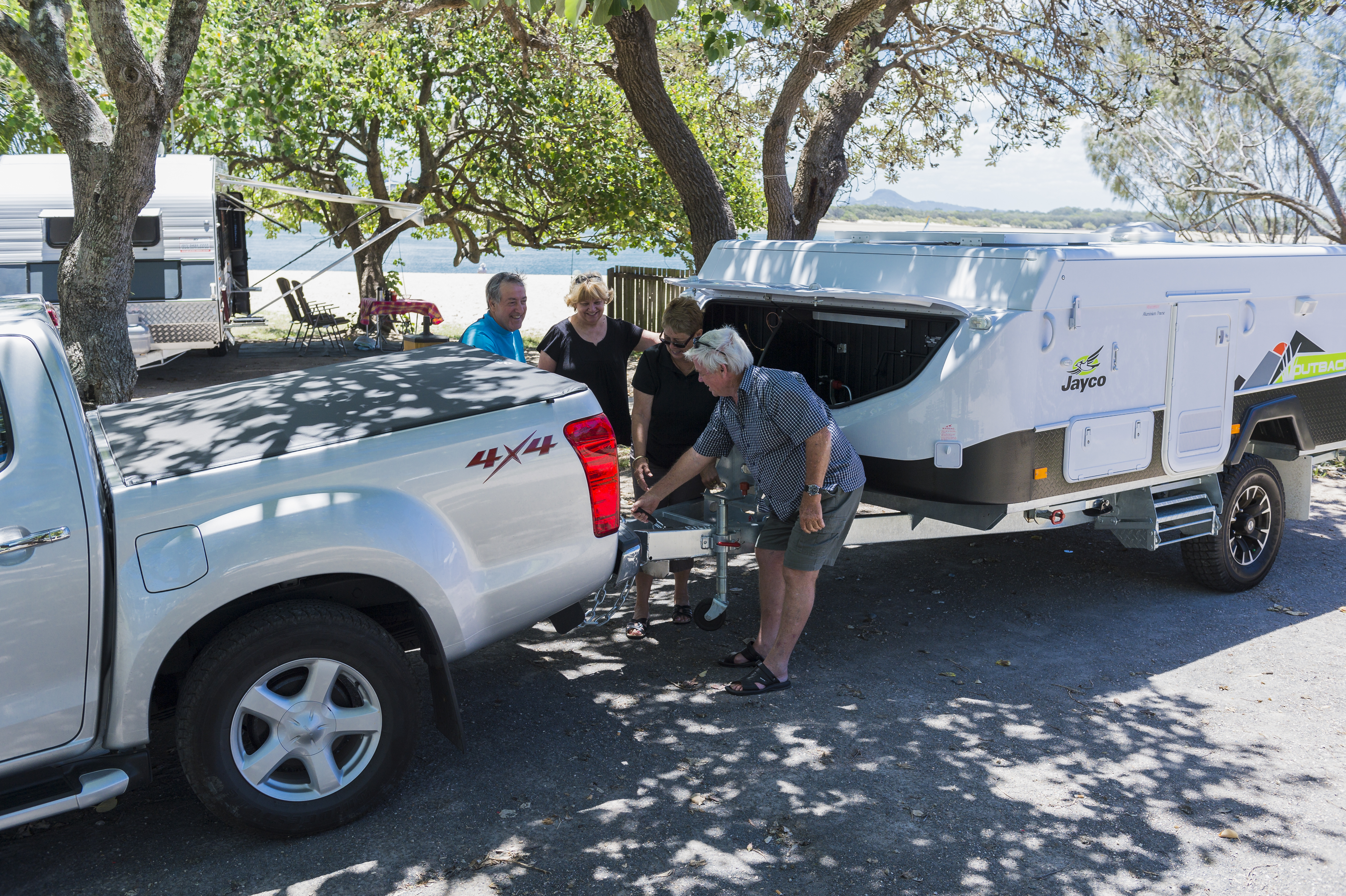
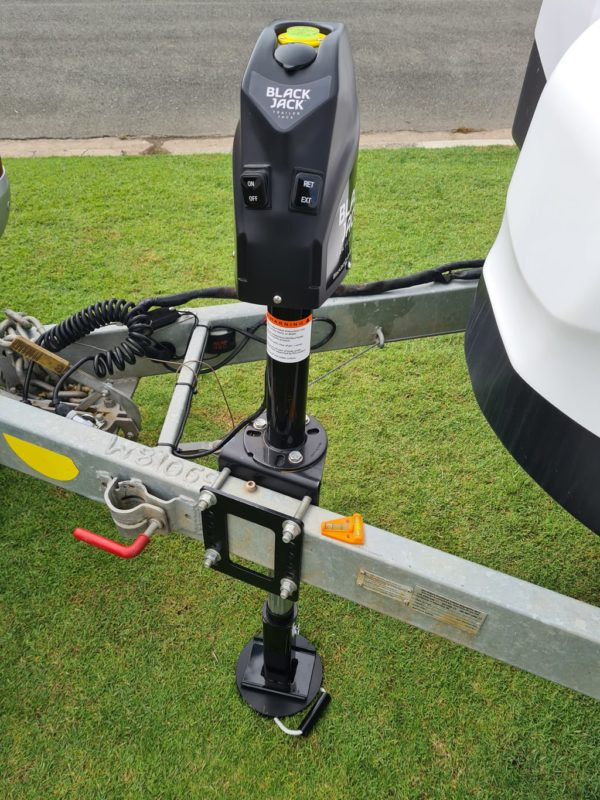
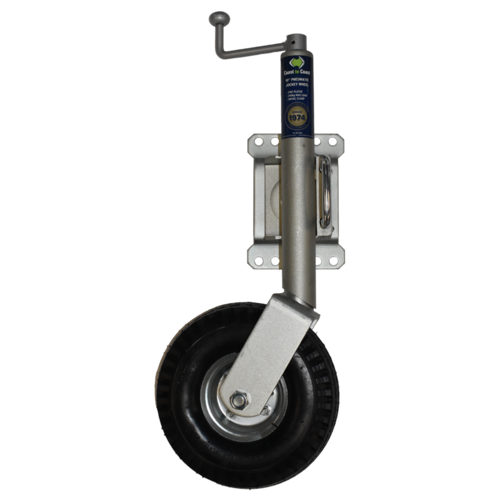
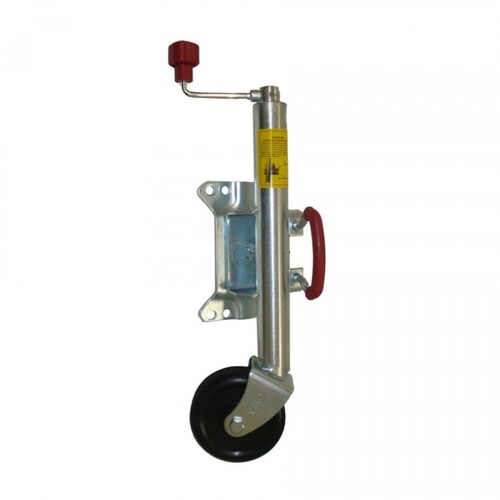
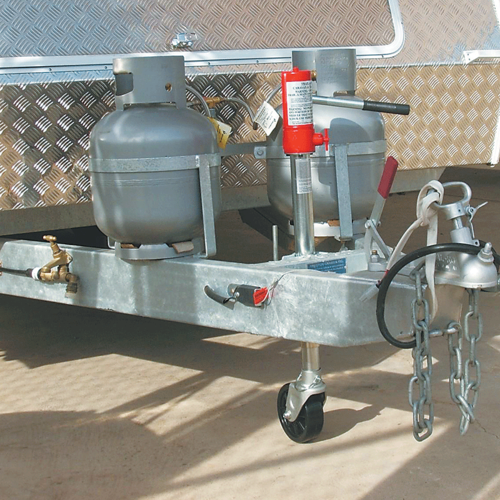
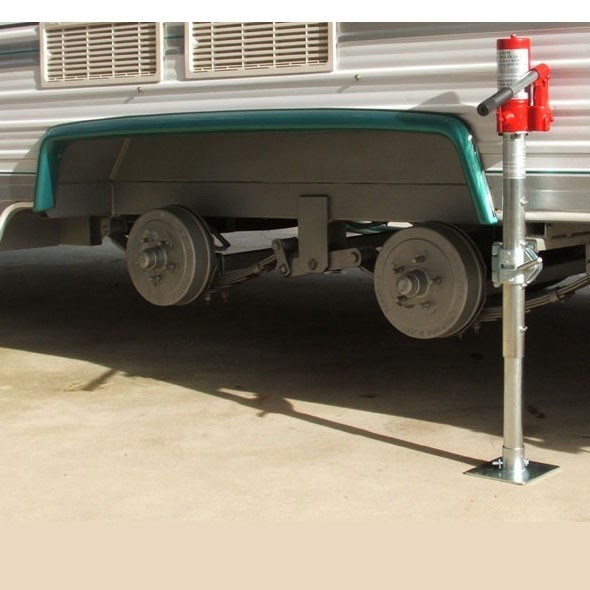
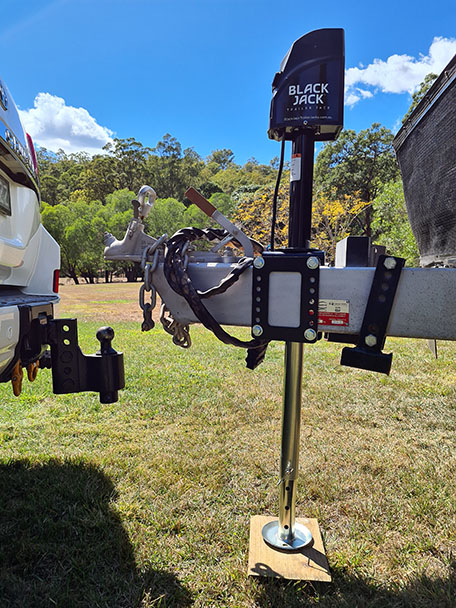
.jpg)
.jpg)
.jpg)
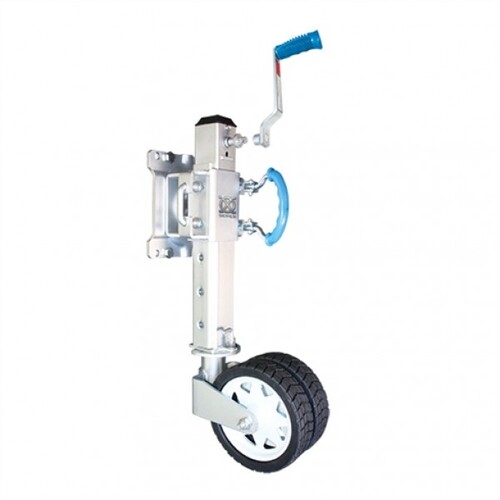
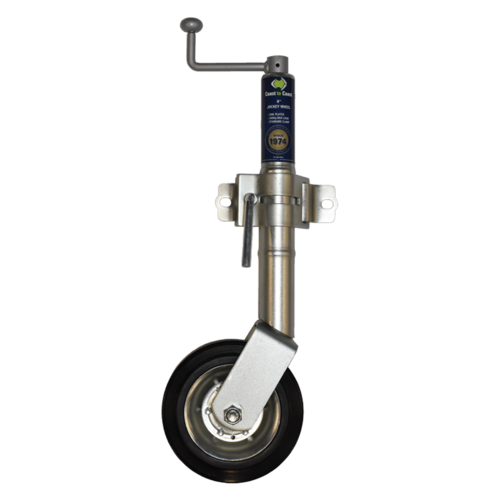
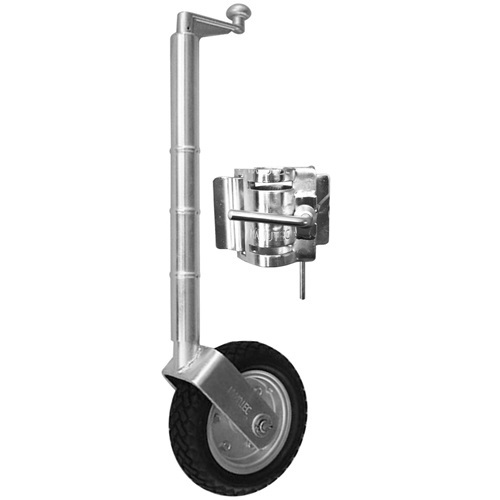
.jpg)




